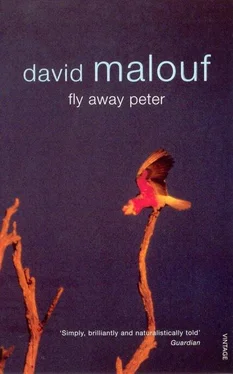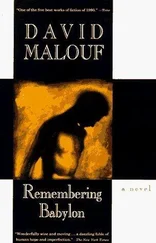‘Abos,’ the girl said again with cool disgust, as if the rituals being enacted, however violent, and in whatever degenerate form, were ordinary and not to be taken note of. ‘Aren’t you coming in then? Slow-coach!’
Her name was Connie. Jim was quite pleased with himself, and with her as well. Walking back afterwards, in the early evening, with the town very lively still and a lot of young fellows standing about drunk under lampposts, some of them with girls but always talking excitedly to one another, he was able to take all this action more easily. Maybe it concerned him, maybe it didn’t. So much of what a man was existed within and was known only to himself, and to those, even strangers, to whom he might occasionally, slowly, reveal it.
He stood at the entrance to the bridge and watched the dark waters of the river swarming with lights and saw the butt of his cigarette, glowing all the way, make a wide arc towards it. Nothing had changed.
But back at the boarding house where he usually stayed, he was wakened not long after he fell asleep by a great noise in the street below, and going with one or two others to the balcony, saw a procession making its way towards them of what looked like thousands. He had never seen so many people in one place before.
They were young men mostly, and some were in uniform, a group of naval ensigns; but there were also women of all ages, and they were all shouting and cheering and offering up snatches of song. At the head of the crowd, on the shoulders of one of the white-suited navy boys, was a little fair-headed lad in a kilt, who was waving his arms about among the flags. He seemed significant in some way — the crowd had chosen him as a symbol — and Jim felt disturbed; he couldn’t have said why. Maybe it was the hour. The loose excitement that had been about all day, and had found no focus, had gathered itself to a head at last and was careering through the streets, sweeping everything before it. Sleepy Brisbane! It might be Paris or somewhere, with all these people surging about in the middle of the night, marching with linked arms and chanting slogans. Crowds made him nervous. Is this what it will be like from now on? he asked himself. Will I get used to it?
One of the old-timers who shared the room with him explained. They were coming, this great press of people, from the Market square, where they had gathered to hear an address from the Lord Mayor. Those noisy outriders of the procession, blatant youths waving scraps of paper, were those who had been enrolled earlier in the evening at the Town Hall, over five hundred they said, and considered themselves to be soldiers already and therefore released from civilian restraint. They were at war.
Jim looked, and wondered if his certainty of a little earlier, that he need not be concerned, would hold. When he went back to bed he couldn’t sleep. Far off, the crowd was still spasmodically sending up faint hurrahs, and scraps of tunes, half-familiar, came to his ear: The Boys of the Old Brigade — they liked that one, they sang it twice — and more solemnly, God Save the King. Lying back with his arms folded under his head, an ordinary if unpatriotic stance, he could imagine all those others falling still and coming to attention as they sang. It might, after all, be serious.
In the morning, as he buttoned his shirt at the window, he looked again at the street where the procession had passed — it was littered with tramtickets and sheets of trampled newspaper that sailed in the westerly — then across the flat, weatherboard city to the hills. By midday he was home.
‘Anything much going on in Brisbane?’ Miss Harcourt enquired.
‘Well,’ Jim said, ‘you know. The war. Not much otherwise.’
Miss Harcourt looked concerned for a moment and he thought she too might ask if he would go. But she didn’t.
Jim stroked his upper lip, where for two days now he had been nursing the beginning of a moustache.
THEY WERE THE days of the big migrations, those last days of August and early September, and Jim spent long hours observing and noting down new arrivals: the first refugees Miss Harcourt called them — a strange word, he wondered where she had heard it. He never had.
Tree martins first, but they came only from the Islands and they came to breed; great flocks of them were suddenly there overnight, already engaged in re-making old nests; dotterel and grey-crowned knots, the various tattlers; once a lone greenshank; then sharp-tailed sandpipers, wood sandpipers from the Balkans, whimbrel, grey plover, the Eastern Curlew, Japanese snipe, fork-tailed swifts from Siberia; then much later, towards the turn of the year, Terek sandpipers and pratincoles, the foreign ones in the same flock with locals but clearly distinguishable. He filled book after book with his sightings, carefully noting the numbers and dates of arrival.
The first sight of a bird, there again, after so many months’ absence, in the clear round of his glasses, with a bit of local landscape behind it, a grass tuft or reeds or a raft of sticks — that was the small excitement. Quickly he took from his pocket the folded notebook with its red oilcloth cover and the pencil stub from behind his ear, and with his eye still on the bird, made his illegible scribbles. The greater excitement was in inscribing what he had seen into The Book.
Using his best copybook hand, including all the swirls and hooks and tails on the capital letters that you left off when you were simply jotting things down, he entered them up, four or five to a page. This sort of writing was serious. It was giving the creature, through its name, a permanent place in the world, as Miss Harcourt did through pictures. The names were magical. They had behind them, each one, in a way that still seemed mysterious to him, as it had when he first learned to say them over in his head, both the real bird he had sighted, with its peculiar markings and its individual cry, and the species with all its characteristics of diet, habits, preference for this or that habitat, kind of nest, number of eggs etc. Out of air and water they passed through their name, and his hand as he carefully formed its letters, into The Book. Making a place for them there was giving them existence in another form, recognizing their place in the landscape, or his stretch of it: providing ‘sanctuary’.
He did his entering up at a particular time and in a particular frame of mind. He liked to have the lamp set just so, and chose a good pen and the best ink; bringing to the occasion his fullest attention; concentrating, as he had on those long boring afternoons at the one teacher school when he had first, rather reluctantly and without at all knowing what it was to be for, learned to form the round, full-bodied letters; and adding with a flourish now the crosses of the big F’s, the curled tails of the Q’s. He was proud of his work, and pleased when, each week, he was able to show Ashley what he had added.
‘Beautiful!’ Ashley said for the names, the writing, as he never did for the actual birds, to which he brought only his silence. And that was right. It pleased Jim to have the verbal praise for The Book and silence in the face of the real creature as it lifted its perfect weight from water into air, since in that way Ashley’s reaction mirrored his own.
When Ashley and Julia Bell were married at the end of the year Jim presented them with the first of the Books; not exactly as a wedding gift, since that would have been presumptuous, and anyway, the Book was Ashley’s already, but as a mark of the occasion. With it went the first of Miss Harcourt’s pictures.
IT WAS JUST before that, in late November, that Jim caught one day, in a casual sweep of his glasses over a marshy bank, a creature that he recognized and then didn’t: the beak was too long and down-curved, the body too large for any of the various sandpipers. He stared and didn’t know what it was. He couldn’t have been more puzzled, more astonished, if he’d found a unicorn.
Читать дальше












